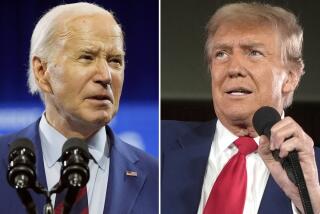Britain, Ireland Set June Date for All-Party Talks
LONDON — Under the shadow of a terrorist threat, Britain and Ireland agreed Wednesday that all-party peace talks on Northern Ireland can begin June 10.
The negotiations will follow elections in the British province to name delegates but can open without further conditions attached, the two governments said.
“The date is fixed. The date will not be changed,” Irish Prime Minister John Bruton told reporters. Talks to establish electoral ground rules and the “basis, participation, structure, format and agenda” of the negotiations begin Monday.
For republican Sinn Fein to join with other Northern Irish political parties at talks it has long demanded, the governments said, the group must pledge itself to democracy and nonviolence. And the militant Irish Republican Army it represents in the struggle to end British rule in the province must reestablish a cease-fire ended earlier this month with a bombing campaign in London.
In his cautious initial reaction Wednesday night, Sinn Fein leader Gerry Adams welcomed the fixed date but stopped far short of signing on to the Anglo-Irish plan. Voicing skepticism about Britain’s commitment, Adams said in a statement: “There is a need for absolute clarity on all aspects of these proposals in assessing whether they contain the inherent dynamic to reestablish the peace process.”
As Bruton arrived Wednesday to confer with British Prime Minister John Major at a hastily arranged summit, the heart of London around Piccadilly Circus was paralyzed by bomb alerts. Chaos ruled on and under sunlit streets as traffic, pedestrians and subway lines were rerouted. “Suspicious package,” explained a police officer behind “Do Not Cross” plastic tape as the prime ministers gathered nearby at No. 10 Downing St. for a working lunch.
Wednesday’s initiative was in response to IRA violence that resumed Feb. 9, ending 17 months of cease-fire and threatening full-scale return to a 25-year struggle in which the British capital became a prominent terrorist target. Manhole covers were welded shut and marksmen lined roofs in London on Wednesday as Queen Elizabeth II and Major gathered among 1,200 VIPs at St. Paul’s Cathedral to unveil a monument to 47 British service members killed in the Persian Gulf War.
In shaping a joint communique from a round of telephone calls and pencil editing over lunch, the two governments each got some of what they had sought during stalled negotiations while the cease-fire was in effect.
Ireland won a specific date for talks that it--like the IRA--has long sought. Britain got the still-undefined election, probably in May, that Major--like the pro-British unionists in Northern Ireland--considers an essential first step. An all-Ireland referendum expressing support for peace could be held that same election day.
In Washington, President Clinton applauded the summons to talks and called on “those who have resorted to violence to heed the voice of the people and cease their campaign of terror.” In a written statement, the president hoped “all the parties will commit themselves to participate fully in the process announced today.”
Many key questions remain unanswered. The largest among them is whether Sinn Fein, which has always said it will accept no conditions for talks, will consider a declaration of democratic principles and a resumed cease-fire acceptable tickets of admission to negotiations.
Speaking with reporters, Bruton and Major rejected the conclusion of some British analysts that the IRA had achieved through bombs that killed three people in London this month what it could not achieve in 17 months of political palaver.
“The position is quite the reverse,” Major said. “If we hadn’t proceeded toward fixed talks, the bombers would have succeeded. They can’t bomb themselves into negotiations. They can bomb themselves out . . . but we will continue without them.”
Said Bruton, “The violence has done nothing but create difficulty. It has not in any way accelerated the process.”
Until the cease-fire is restored, no ministers from either country will meet Sinn Fein, whose participation in the meetings opening Monday is therefore likely to be limited.
The peace process stalled for fretful months over Britain’s demand for the surrender of weapons from the IRA’s arsenal before talks opened. That roadblock was removed last month when an international mediation panel headed by former U.S. Senate Majority Leader George J. Mitchell (D-Maine) called for arms “decommissioning” as talks proceed--a halfway house between Britain’s position and IRA insistence that no guns would be spiked before a political settlement was reached.
On Wednesday, Major said decommissioning would be high on the agenda of talks, as would the irrevocable Sinn Fein declaration of democratic principles demanded by the Mitchell panel.
“These issues, however difficult, cannot be dodged,” Major told Parliament following the summit. “They will be on the table at the beginning of negotiations. Any party not committed to these principles . . . would in our view have no place at the negotiating table.”
More to Read
Sign up for Essential California
The most important California stories and recommendations in your inbox every morning.
You may occasionally receive promotional content from the Los Angeles Times.










